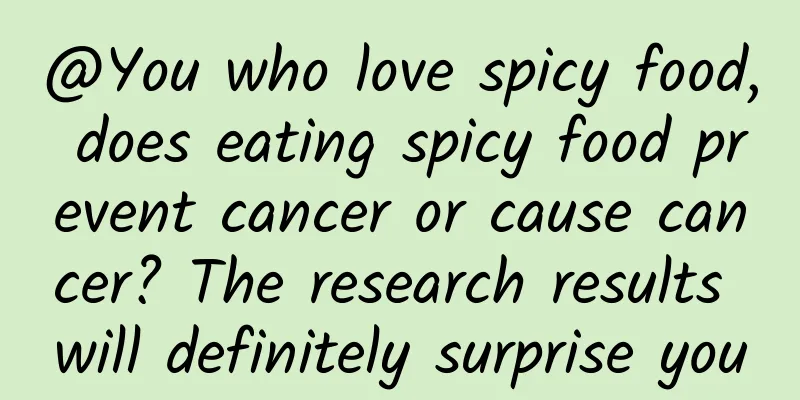@You who love spicy food, does eating spicy food prevent cancer or cause cancer? The research results will definitely surprise you

|
As a common condiment, chili pepper plays an important role in cuisines around the world. As scientific research continues to deepen, people have become very interested in the relationship between eating spicy food and health. Among them, one of the most hotly debated issues is: Does eating spicy food prevent cancer or cause cancer? A study involving 510,000 people in my country provides evidence. A study published in the International Journal of Epidemiology followed up 512,715 Chinese people aged 30 to 79 for 10 years and found that eating spicy food was negatively correlated with the risk of three types of cancer. Eating spicy food is indeed effective in reducing the risk of digestive tract tumors The study was conducted by a research team from Peking University and the University of Oxford in the UK. The participants' spicy food intake included fresh and dried peppers, chili oil, sauce, etc. The frequency of eating spicy food was divided into five groups: never eating spicy food, occasionally (once a month), 1-2 days a week, 3-5 days a week, and every day. The study found that the frequency of chili consumption was negatively correlated with the risk of gastrointestinal cancer. Specifically, compared with people who do not eat spicy food, people who eat spicy food occasionally, 1-2 days a week, 3-5 days a week, and every day have a 12%, 24%, 16%, and 19% lower risk of esophageal cancer, a 3%, 5%, 8%, and 11% lower risk of gastric cancer, and a 0%, 5%, 13%, and 10% lower risk of colorectal cancer, respectively. Further analysis found that the reduction in the risk of colorectal cancer is limited to rectal cancer. Compared with people who do not eat spicy food, people who eat spicy food every day have a 19% lower risk of esophageal cancer, an 11% lower risk of gastric cancer, and a 10% lower risk of rectal cancer. The following are the associations between the frequency of eating four types of spicy food and a lower risk of cancer. The type of spicy food and the intensity of the spiciness had little effect on these associations: In addition, when the researchers combined the analysis with smoking and drinking factors, they found that among non-drinkers and non-smokers, a high frequency of chili consumption was more significantly associated with a lower risk of gastrointestinal cancer. People who ate spicy food every day and never smoked had a 43% lower risk of esophageal cancer. People who ate spicy food every day and never drank alcohol had a lower risk of all three cancers, including a 27% lower risk of esophageal cancer. Besides being spicy, peppers have many benefits First, let's learn about peppers. The spicy taste of peppers is mainly because they contain a chemical called capsaicin, which is a natural alkaloid with a strong spicy taste. In addition to capsaicin, peppers also contain a variety of vitamins (such as vitamin C and vitamin A) and antioxidants such as carotenoids and flavonoids. These ingredients play an important biological role in the consumption of peppers. Capsaicin not only adds spiciness to peppers, but also has other benefits: it has multiple biological activities, including antioxidant, anti-inflammatory, antibacterial, and analgesic. Studies have shown that capsaicin can affect biological processes such as cell growth, differentiation, and apoptosis by activating or inhibiting multiple signaling pathways. In addition, antioxidant substances such as vitamin C and carotenoids in peppers also have a positive effect on scavenging free radicals and reducing oxidative stress. Chili peppers have an inhibitory effect on tumors However, eating too much spicy food can cause gastric mucosal damage Will eating spicy food cause cancer? This question has aroused the curiosity and concern of many people. Capsaicin in peppers is believed to have antioxidant, anti-inflammatory and anti-tumor potential. Some studies have shown that capsaicin can inhibit the growth, spread and angiogenesis of tumor cells by regulating multiple signaling pathways, thereby preventing the occurrence of cancer to a certain extent. In particular, experimental studies on some types of cancer, such as breast cancer and prostate cancer, have shown the inhibitory effect of capsaicin on tumor cells. However, there are divergent research results on whether chili peppers are directly carcinogenic. There are some studies that support the view that chili peppers can prevent cancer. However, it should be noted that high concentrations of capsaicin may irritate the gastric mucosa, and excessive consumption may cause gastrointestinal problems, affect food digestion and nutrient absorption, and may affect overall health; and may increase the risk of digestive system cancers such as gastric cancer. A study published in the Asia Pacific Journal Clinical Nutrition showed that high levels of chili pepper intake were positively correlated with the risk of gastric cancer. This means that excessive consumption of chili peppers may have a certain impact on stomach health. Scientific research on the relationship between chili peppers and cancer is still ongoing. Although some studies support the cancer prevention potential of chili peppers, the results are not consistent. Scientists are exploring the mechanisms of action of various components in chili peppers and how different types of cancer cells respond to chili peppers. These studies are helping to provide a more complete understanding of the link between chili peppers and cancer. Eat peppers appropriately to achieve a healthy life 1. Balanced diet. It is safe to eat peppers as a condiment in moderation. However, peppers are not the only food. A balanced intake of various foods can provide comprehensive nutrition. It is recommended to add vegetables, fruits, whole grains and other foods to the diet to maintain a balanced diet structure. 2. Individual differences. Individuals have different tolerances to chili peppers. Some people may be more easily stimulated by chili peppers, while others can adapt to the spiciness better. When eating chili peppers, you can adjust the amount of consumption appropriately according to your personal taste and physical condition. At present, there is no clear conclusion on whether eating chili peppers can prevent cancer or cause cancer. The active ingredients in chili peppers may have a positive effect on cancer prevention, but excessive consumption may bring some health risks. In general, a scientific and reasonable diet and a healthy lifestyle are the key to cancer prevention and treatment. Source: Chongqing University Cancer Hospital Author: Cao Haoyang, nutritionist at the Affiliated Cancer Hospital of Chongqing University and national registered nutritionist. Review expert: Yu Huiqing, Director of the Department of Geriatric Oncology/Nutrition, Affiliated Cancer Hospital of Chongqing University, Chief Physician, Master Supervisor Statement: Except for original content and special notes, some pictures are from the Internet. They are not for commercial purposes and are only used as popular science materials. The copyright belongs to the original authors. If there is any infringement, please contact us to delete them. |
>>: Beautiful and useful! That beautiful "white house" actually "monitors" radiation?
Recommend
10 things to know before buying a mobile VR headset
1. Field of view Some of the most popular domesti...
Don’t know how to develop VR games? Unity 5.3 official VR tutorial is released - Series 2
[[163670]] Laying the foundation In order to prep...
Case Analysis | 6 Strategies to Unravel the Addictive Gameplay of Pinduoduo
Did you shop on Double Eleven? Is your shopping c...
Teasing Microsoft Cortana, it will answer you like this
Microsoft's personal voice assistant Cortana i...
How much does it cost to join an automatic printing mini program in Anqing?
What is the price to join the Anqing automatic pr...
With more members joining the platform, how can we ensure the effectiveness of Baidu Ai Purchasing?
If the number of Baidu Aicaigou members increases...
New Toutiao traffic strategy
Recently I found that some friends wanted to attr...
Derivation and thinking of user operation system
A system is a whole composed of similar things wi...
An unheard of brand becomes the leader in Indian mobile phones, and Americans are shocked again
[[127466]] To be honest, the American media now h...
What should we pay attention to when developing and registering mini programs?
For individual developers 1. Make page navigation...
Will VR become the next smart TV?
[[161223]] At the end of 2015, VR seemed to have ...
Its selenium content is 41.7 times that of an apple! Fruit cores are also very nutritious, but unfortunately many people throw them away...
Jackfruit, have you eaten it this year? Many peop...
The new idol era: fan economy and social platforms reconstructed by live streaming
WeChat still throws out easter eggs from time to ...
Gigabyte, which plays two-faced roles and eats and ruins the pot, is about to see its good days in the mainland market come to an end
Gigabyte, an electronics brand from Taiwan Provin...
How does Meituan trick its members?
The Double 11 and Double 12 carnival is over, are...









